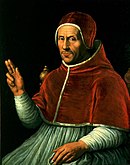Papal conclave, 1521–1522

Coat of arms during the vacancy of the Holy See
|
|
| Dates and location | |
|---|---|
| 28 December 1521 – 9 January 1522 Apostolic Palace, Papal States |
|
| Election | |
| Candidates | Giulio di Giuliano de' Medici, Alessandro Farnese, Thomas Wolsey |
| Elected Pope | |
|
Adriaan Florenszoon Boeyens (Name taken: Adrian VI) |
|
 |
|
The papal conclave, 1521–1522 elected Pope Adrian VI to succeed Pope Leo X. The conclave was marked by the early candidacies of cardinal-nephew Giulio de'Medici (future Pope Clement VII) and Alessandro Farnese (future Pope Paul III), although the Colonna and other cardinals blocked their election.
Adrian, the viceroy to Spain and a clear pro-Imperial candidate, was elected as a compromise candidate despite his absence from the conclave. The number of cardinal-electors (thirty-nine) and the length of the sede vacante increased the cost of the conclave even in excess of the funds distributed by Charles V, Holy Roman Emperor, Francis I of France, and Henry VIII of England to promote their candidates.
There were thirty-nine cardinal electors, only three of whom were non-Italians (two Spaniards and one Swiss). Nine non-Italians did not attend (compared to only one Italian), despite the lengthy delay. The lengthy delay was due to the capture of one cardinal on his way to Rome, who was held for ransom. In the meantime, the agents of Charles V, Holy Roman Emperor, Francis I of France, and Henry VIII of England began to distribute the large sums that the monarchs had sent to Rome for bribes.
The preferred choice of Henry VIII was Thomas Wolsey (for whom he was prepared to spend 100,000 ducats), although Giulio de'Medici (future Pope Clement VII) was also acceptable to him. Henry VIII asked Charles V (with whom he was allied) to support Wolsey and send his army to Rome. Even the large bribes of these monarchs were less than the cost of the conclave, and even the papal tiara was mortgaged to continue to fund it, and only a very few of the Italian cardinals would even consider a non-Italian.
...
Wikipedia
